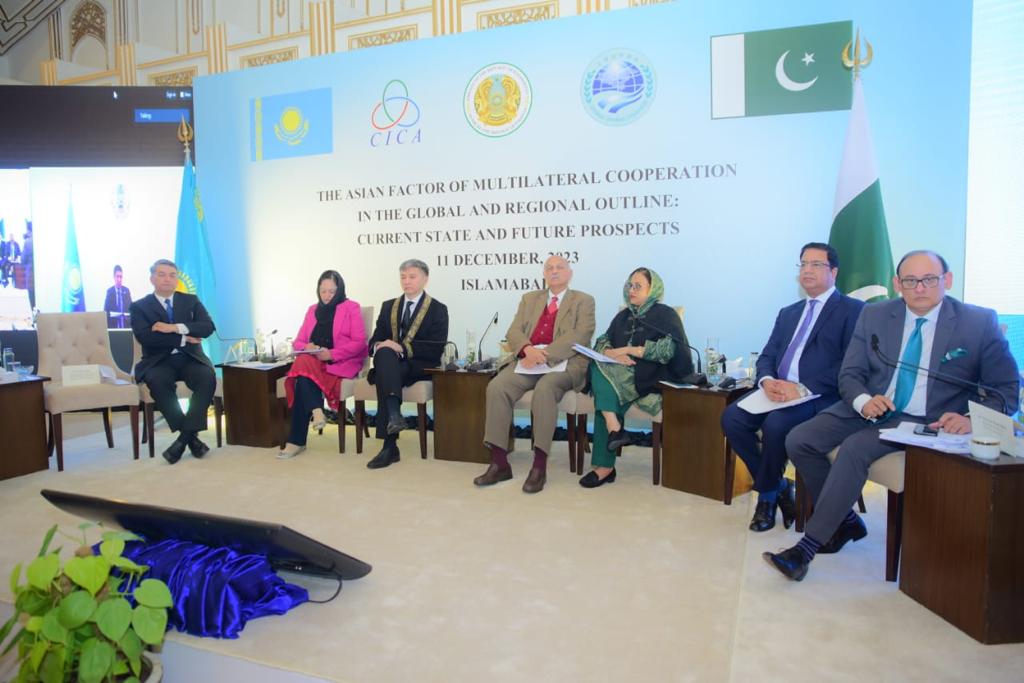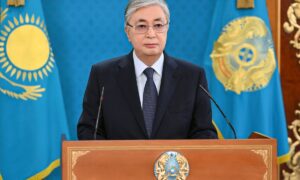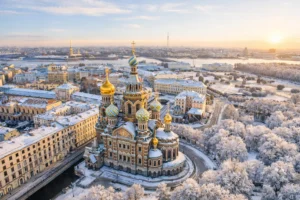Trade and Economic Interaction – A factor of Integration and Consolidation of the Structure
Speech by Mr. Khalid Taimur Akram at Round table on the topic “The Asian factor of multilateral cooperation in the global and regional outline: current state and future prospects”, dedicated to the priorities of the chairmanship of the Republic of Kazakhstan in CICA and SCO

At the heart of China’s Belt and Road Initiative (BRI), Kazakhstan plays a pivotal role, serving as a key node and fostering extensive cooperation with China across various sectors within the BRI framework. Kazakhstan has fostered profound connections and bolstered economic cooperation with neighboring countries, emphasizing the enhancement of trade collaborations.
Kazakhstan’s significance in the initiative is further underscored by its historical association, as it was in Kazakhstan that President Xi Jinping first introduced the Silk Road Economic Belt concept a decade ago during his official visit. The ongoing completion of BRI transport projects holds the promise of reducing shipment times, attracting increased foreign direct investment (FDI), and boosting non-oil exports and GDP.
Kazakhstan’s historical role as a crucial nexus for transportation and trade remains unchanged. Remarkably, over 80% of goods en route from China and Central Asia to Europe, measured by volume, traverse through Kazakhstan, solidifying its position as a vital bridge for regional economic integration. Furthermore, Kazakhstan’s commitment to large-scale projects is significantly enhancing the transportation of processed and food products.
The exchange of goods among diverse nationalities went beyond mere commercial transactions; it fostered a continuous and widespread process of cultural interaction. This interaction wasn’t confined solely to economic ties but extended to intellectual and cultural exchanges occurring in regions that evolved into vibrant hubs of culture and learning. As a result, civilizations found common ground, uniting through shared experiences along these trade routes.

The Silk Roads and other historic trade routes served as conduits not only for the physical exchange of products but also for the dissemination of knowledge. Science, arts, literature, crafts, and technologies were shared across societies connected by these routes. This facilitated the mutual enrichment of cultures, leading to a dynamic interchange where languages, religions, and cultural practices developed and mutually understood each other.
The interconnectedness of trade and economic activities, therefore, became a catalyst for a profound and enduring cross-cultural exchange that transcended mere economic transactions, contributing to the vibrant tapestry of human history.
President Kassym Jomart Tokayev’s Economic Policies
President Kassym Tokayev’s leadership has made substantial investments in infrastructure and placed a strong emphasis on human capital development, yielding positive results. The visionary leadership of President Tokayev has been instrumental in sustaining and enhancing initiatives such as sustaining foreign investment, strengthening regional connectivity, and promoting environmental sustainability.
Kazakhstan’s economy has become highly globalized with the implementation of numerous projects and policies. Notably, the development of large cities and the liberalization of the financial market have contributed to improvements in living standards, along with significant advancements in education, infrastructure, and governance. President Tokayev’s focus on attracting foreign banks to stimulate competition and increase corporate lending marks a significant step in ensuring the availability of capital for businesses.

Furthermore, the president has reaffirmed his commitment to green economic growth in alignment with global sustainability and environmental stewardship efforts. Kazakhstan is actively investing in renewable energy sources such as solar and wind, as well as emerging technologies like hydrogen production. This commitment not only reflects environmental responsibility but also positions Kazakhstan at the forefront of technological advancements in the pursuit of a sustainable and resilient economy.
Economic Corridors
Kazakhstan plays a pivotal role in the Belt and Road Initiative (BRI), emerging as a central participant in two key corridors: the New Eurasian Land Bridge and the China-Central Asia-West Asia Corridor. Kazakhstan serves as a crucial geo-economic gateway. The country, serving as a gateway between the East and West, stands as a key regional trade connectivity route.
President Tokayev has articulated ambitious plans to establish Kazakhstan as a major transit hub in Eurasia, with a focus on critical routes such as the Trans-Caspian and the international North-South Corridor, thereby enhancing regional connectivity and facilitating trade.
Kazakhstan is actively implementing various projects in industry, transport, and logistics in collaboration with China and as a key provider of logistical services, linking China not only to Europe but also to West Asia, Central Asia, and other Central Asian countries, along with Iran through the southern sub-corridor.
Kazakhstan is witnessing the rapid modernization and urbanization of many BRI countries. The expansion of roads, railways, ports, airports, pipelines, and technology infrastructure is remarkable. This surge in connectivity is creating stronger commercial opportunities and fostering the integration of less developed markets with global economic systems.
These initiatives have not only enhanced connectivity but have also facilitated the seamless transport of Kazakh products to sea ports, opening up new avenues for international trade and economic cooperation.
Trade between Pakistan and Kazakhstan
In the first half of 2023, the trade between Pakistan and Kazakhstan reached more than 139 million US dollars, reflecting an impressive 87% increase compared to the same period last year. In pursuit of further economic collaboration, both countries have collaboratively designed a roadmap with the ambitious objective of elevating bilateral trade to a significant milestone of $1 billion. This target underscores their shared commitment to fostering trade development between the two nations. Noteworthy progress can be observed in trade and commerce activities, exemplified by Kazakhstan’s initiative to dispatch several trucks along a new trade route to Pakistan through Afghanistan, signaling a positive momentum in boosting friendly relations.


